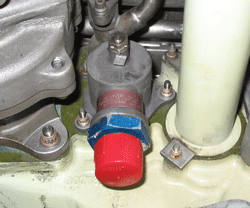Contributed by Lanny Renshaw, Assistant Manager Turbine Engine Services

When faced with an oil pressure squawk, check the Breather Pressurizing Valve.
Many factors will cause a low or high oil pressure indication on TFE731 engines. One of the more common causes is a faulty Breather Pressurizing Valve (BPV). The following are two scenarios that will lead you to this conclusion.
Oil Pressure Rises During Decent
If the crew reports normal oil pressure at altitude but the pressure rises as the aircraft descends, the most probable cause is the BPV is stuck closed. At sea level, the valve should be open at least .07 in. A defective bellows will cause the valve to be closed on the ground. With a strong light, visually check the BPV. If it is closed, replace the BPV.
Oil Pressure Drops During Climb
Oil pressure that is normal below 27,000 ft but drops as the aircraft climbs higher is another indication the BPV is not closing. Remove the BPV and push on the bellows. They should not move. If you are able to move them, replace the BPV. If the bellows feels normal, swap with the opposite engine. If the squawk is still present, contact your TFE731 Service Center.
TFE731 Engine Oil System Presentation
I will be giving an in-depth presentation on the entire TFE731 Oil System at the Duncan Aviation Intelli-Conference on Sept. 22nd in Teterboro, NJ. My presentation will include additional steps to troubleshoot oil pressure problems, an overview of the oil system schematic and troubleshooting oil leaks. The class is free and attendees will get Inspection Authorization (IA) renewal credit. Register now to reserve your seat!
Duncan Aviation holds service authorizations for Honeywell TFE731-2/-3/-4/-5/20/40/60 Major (MPI) engines at its full-service facilities in Lincoln, NE (LNK), and authorized line services in Battle Creek, MI (BTL). Our TFE731 engine program has been in place since 1980, and we have assembled teams with some of the most talented engine technicians in the industry.
Lanny Renshaw, Assistant Manager of Turbine Engine Services in Lincoln, NE (LNK), manages Duncan Aviation’s modern 20,000-square-foot facility with 12 separate engine bays dedicated to support of the Honeywell TFE731. He started his aviation career in 1982.


